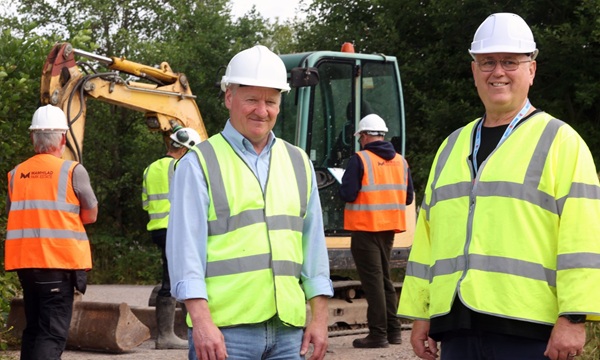Welsh business leaders have given a cautious welcome to the Spring Budget 2024, saying whilst it offered few surprises it did contain a number of positive announcements for Wales.
In a special discussion for Business News Wales, host Carwyn Jones was joined by Ben Cottam, Head of Wales at the FSB, Paul Butterworth, CEO of Chambers Wales, and Ian Price, Director of CBI Wales.
They offered their views on what the Treasury called a “Budget for Long Term Growth”, discussing measures including a rise in the VAT threshold, an extension to full expensing, and targeted support for fast-growing industries including the creative sector.
The panel also considered elements of the Budget which directly impact Wales, such as an extension to the Investment Zones programme from five to 10 years, and an announcement around an agreement with Hitachi to acquire the Wylfa site in Ynys Môn.
To listen to the fully unedited interview
Further reactions from business leaders across Wales on the spring budget.
Robert Lloyd Griffiths OBE, Director of ICAEW in Wales said:
“It’s the rhetoric that grabs the headlines – more investment, more jobs and better public services. Nobody would argue with this but it is yet to be seen if we really have turned a corner on inflation and will soon turn the corner on growth. The Chancellor talked a good story today and there is no doubt that the additional support for small businesses with the increase in the VAT threshold to £90,000 plus funding for specific sectors and projects in Wales will be welcomed by many, as will the increase of £170 million as a result of the Barnett Formula. The announcement that a deal has been done by the UK Government to purchase Wylfa from Hitachi is good news for North Wales, as is the additional levelling up funding for Conwy, and both will help to drive growth and ensure future prosperity. I know that ICAEW members will be pleased with these measures, while also closely monitoring the detail of the changes to taxation.”
Lloyd Powell, head of ACCA Cymru/Wales, said:
“Today’s announcements by the Chancellor are likely to be cautiously welcomed by Welsh businesses.
“Small businesses in particular will be pleased to have some breathing space on VAT, with the threshold increased slightly to £90,000. ACCA had called for this given the artificial brake on growth it represents for smaller businesses, combined with the knock-on impact to HMRC of dragging more businesses into this tax regime at a time when service levels are already at historically poor levels.
“We welcome the commitment to further improvements to the R&D tax relief scheme, as well as plans to improve regulation in the tax advice market, to recognise the value of professional agents.
“As well as the effects from the NI cut, VAT registration threshold increase, child benefit changes, alcohol and fuel duty freezes, the Chancellor announced that Wales will be allocated a ‘Barnett consequential’ of £170m. He also announced Levelling Up funding for Welsh projects – £10m for Venue Cymru and £5m for Newport. The Chancellor also announced a £160m deal for the UK government to purchase the site of the planned Wylfa nuclear site in North Wales.
“The Chancellor announced the scrapping of the Furnished Holiday Lets scheme, which gives extra tax reliefs on properties being rented out to holidaymakers. There are more than 11,000 self-catering holiday lets in Wales, according to the Welsh Government's latest list of properties paying non-domestic rates.
“Whilst a welcome simplification to the tax system overall may boost the availability of rented accommodation locally, the removal of the short-term holiday let regime will be a blow for some. The Welsh Government has already introduced changes to make it harder for holiday lets to be exempt from council tax.”
Alistair Wardell, partner at Grant Thornton UK LLP and head of its restructuring team in the South of England and Wales, said:
“With the economy technically in recession, it was no surprise that today’s budget included a raft of measures to boost growth and incentivise long term investment. North Wales in particular was singled out for support across both its culture and energy sectors, with Theatre Clywd to receive renovation funding and the government intending to purchase the Wylfa site on Anglesey, where there are plans for a nuclear power station.
“Smaller firms will appreciate the threshold for VAT registration going up from £85,000 to £90,000. At the other end of the scale, funding for clean energy, AI and innovative tech, as well as childcare support to lower job vacancies, will be welcomed by larger firms for whom these are key issues.
“In many ways this aligns with the priorities of Welsh business leaders, as in our latest Business Outlook Tracker we found that their top two challenges were sustainability and digital transformation.
“The Chancellor’s permanent cuts in taxation and support for dynamic economies are ambitious, but hopefully will bring positive change to businesses and encourage long-term growth.”
Ben Willmott, head of public policy for the CIPD, the professional body for HR and people development, commented:
“The Government’s focus on boosting research and development and growth in high-tech and green energy sectors, while critically important, is too narrow. This Budget sorely lacked a broad economic strategy to improve living standards and boost productivity across the economy including in sectors like retail, hospitality, transport, logistics and social care which employ millions of people.”
“There is a real and urgent need for a workforce plan for the UK to raise employer investment in skills and support workers’ wellbeing and participation in the labour market.”
“The National Insurance cut will be welcomed by many workers but it’s highly optimistic to suggest that this move alone will get the equivalent of 200,000 more people into full time work and solve for one in five vacancies. The factors affect UK labour market participation are much more complex. For instance, there was nothing in the Budget to reduce rising levels of economic inactivity due to ill health. Health policy is economic policy and requires more ambition from Government and significant changes such as improving employer access to occupational health services and reforms to Statutory Sick Pay.”
“There was also very little to address skills and tackle the hard-to-fill vacancies facing many employers. We urgently need the Government to heed the long-standing calls of employers and business groups and reform the Apprenticeship Levy to reverse the collapse in the use of apprenticeships in SMEs and among young people since 2017. This vital reset would help boost training and development in all its forms and ensure that more apprenticeship opportunities go to the group that most need and benefit from them, young people.”
“The Government is right to prioritise improving public sector productivity. However there needs to be a complimentary focus on improving people management and workforce skills if new technology is to be adopted effectively to improve the delivery of public services.”
Zoe Knight, Head of Commercial at NFU Mutual, said:
“Small businesses and the self-employed received a boost in the Spring Budget with the news that the VAT threshold is rising from April.
“In a bid to support those businesses and sole traders, Jeremy Hunt has increased the current £85,000 threshold to £90,000, meaning an additional £5,000 in turnover can be earned before you need to register for VAT.
“This could bring tens of thousands out of paying VAT and will hopefully allow more of our small businesses to grow.
“This increase has been seven years in the making – with HMRC freezing the threshold in 2017 – and will be long-awaited by small businesses and the self-employed.
“An additional bonus for the self-employed was a further cut on National Insurance. Having been cut from 9% to 8% in the Autumn Statement, the Chancellor again cut 2% off, down to 6% in a boost that would see workers take home more of their monthly pay packet.”
Andy Chamberlain, Director of Policy at IPSE, said:
“Today’s Budget was an encouraging sign that the Chancellor is beginning to listen to the self-employed. But despite the welcome cut to National Insurance and the raising of the VAT threshold, the measures failed to address the substantive issues holding the self-employed back, from IR35 to the looming cost of Making Tax Digital.
“It’s positive that the Chancellor has heeded IPSE’s call to raise the VAT registration threshold. This increase, whilst modest, will alleviate a barrier to the growth of our smallest businesses and it is encouraging to see the Chancellor recognise that in today’s Budget.
“And while the cut to National Insurance will be welcomed by the UK’s 4.2 million self-employed, any benefit may well be undermined by frozen thresholds and continued inflation.
“The self-employed make an enormous contribution to our economy and society, but it could be even greater if the government were to grasp the nettle of IR35 and address the forthcoming impact of Making Tax Digital for Self Assessment.”







